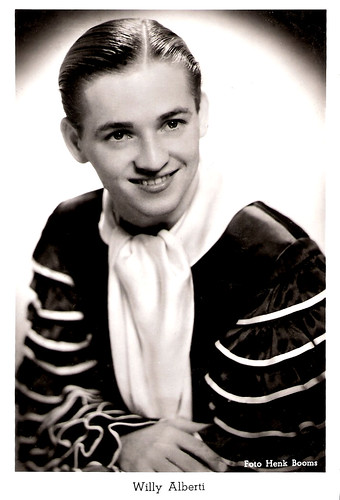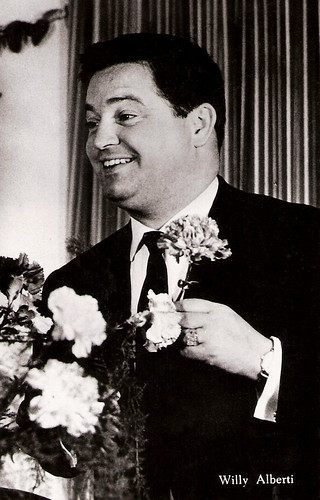Dutch tenor Willy Alberti (1926-1985) sang in Dutch and Italian. The internationally popular ‘Tenore Napolitano’ was also an actor, and radio and TV personality.

Dutch card. Photo: Henk Booms.

Dutch card.

Dutch postcard by Gebr. Spanjersberg N.V., Rotterdam (SPARO). Photo: Phonogram.
Willy Alberti was born as Carel Verbrugge in Amsterdam, The Netherlands in 1926. He was the third of eight children born to Jacobus Willem Verbrugge and Sophia Jacoba van Musscher.
One of his cousins, Jantje van Musscher, would also become a popular Amsterdam singer under the stage name Johnny Jordaan. At the time, de Jordaan was a famous working-class neighbourhood in the heart of Amsterdam.
In 1931, the 5-year-old Carel made his singing debut. From then on, he sang on street corners, often with his cousin Jantje. He began recording professionally in the early 1940s as 'Willy Alberti Tenore Napolitano'.
He married Hendrika Geertruida 'Ria' Kuiper in 1944, and his daughter Willeke Alberti was born a year later. In 1950 followed son Tonny Alberti.
After the war, Alberti established himself in the Netherlands with hits like Ik zing dit lied voor jou alleen (1946, I Sing This Song For You Alone), Veel mooier dan het mooiste schilderij (1946, More beautiful than any picture) and Droomland (1950, Dreamland). In the 1940s he also worked as an actor in popular stage dramas by Henvo (Henk Voogd) a.o.

Dutch promotion card for Delbana watches.

Dutch postcard by VITA NOVA. Photo: Henk de Looper / Phonogram Publicity card for Anker watches, imported by P.H. Bonewit, Amsterdam. Willy with his daughter Willeke Alberti.
In the 1950s Willy Alberti became increasingly popular with his Italian songs. He often performed them on the Duch radio in the popular show De bonte dinsdagavondtrein (The colorful Tuesday evening train).
In 1958 he made his debut on Dutch television in the show of the legendary Dutch clown Dorus. Alberti had a string of hits, including 'Ci-ciu-ci' (1955), 'Vivere' (1955), 'Nel blu dipinto di blu/Volare' (1958), 'Come prima' (1958), the #1 hit 'Piove' (1959), 'Una marcia infa' (1959), and another #1 hit, 'Marina' (1959).
As Guillermo Alberti or Gino Fattori he was also internationally well known. His version of 'Marina' was the first Dutch hit to reach the Billboard Hot 100 in the USA.
Alberti played a part as a café owner in the successful Dutch film Rififi in Amsterdam (John Korporaal aka Giovanni Korporaal, 1963) starring Maxim Hamel and Johan Kaart. However, his film appearances were only incidental.
In a duet with his daughter Willeke Alberti, he scored hits on the Dutch charts like 'Sei rimasta sola' (1963) and 'Sabato sera' (1964). Solo, he had another #1 hit with 'Buono notte bambino' (1963). From 1965 father and daughter presented a popular monthly television show at the public broadcasting station AVRO. During the 1960s, Alberti won twice the prestigious Edison Award.

Dutch postcard by Gebr. Spanjersberg N.V. (Sparo), no. 1296. Photo: Phonogram.

Dutch postcard, no. 11-66Ph 2694. Publicity card for Philips. Autograph of Willeke Alberti.

Dutch postcard by Art Unlimited, Amsterdam, no. B 1729, 1993. Photo: Dirk de Herder. Caption: Willy Alberti at the Westertoren, Amsterdam, 1962.
In the 1970s, Willy Alberti's fame began to recede, though he did score a few hits, including 'Juliana bedankt' (1980, Thanks Juliana), a tribute to former Queen Juliana, and another duet with daughter Willeke, 'Niemand laat z'n eigen kind alleen' (1983, Nobody leaves his child alone).
He also played another small part in a film, Rooie Sien/Red Sien (Frans Weisz, 1975), which featured his daughter Willeke Alberti as Sien. He started a record store, where his son Tonny worked.
In 1984 Willy Alberti was diagnosed with liver cancer, and he died the next year at the age of only 58. He was cremated at the Westgaarde Crematorium in Amsterdam.
A Willy Alberti museum was founded by his wife in 1997 to commemorate him. It was opened in 2001 in the centre of Amsterdam, but it closed due to a lack of interest.
Willy's grandson Johnny de Mol is now a well-known actor and TV personality in the Netherlands. He acted in several films, including Paul Verhoeven's Zwartboek/Black Book (2006).
Scenes from Rififi in Amsterdam (1962), sorry, without Willy Alberti. Source: 121omePiet (YouTube)
Willy Alberti and Johnny Jordaan sing 'Droomland'. Source: Gerrit Wilbrink (YouTube).
Willy Alberti sings one of his last hits, 'De glimlach van een kind' (The smile of a child). Source: William 842 (YouTube).
Sources: Wikipedia (Dutch and English), and IMDb.
This post was last updated on 29 April 2020.

Dutch card. Photo: Henk Booms.

Dutch card.

Dutch postcard by Gebr. Spanjersberg N.V., Rotterdam (SPARO). Photo: Phonogram.
More beautiful than any picture
Willy Alberti was born as Carel Verbrugge in Amsterdam, The Netherlands in 1926. He was the third of eight children born to Jacobus Willem Verbrugge and Sophia Jacoba van Musscher.
One of his cousins, Jantje van Musscher, would also become a popular Amsterdam singer under the stage name Johnny Jordaan. At the time, de Jordaan was a famous working-class neighbourhood in the heart of Amsterdam.
In 1931, the 5-year-old Carel made his singing debut. From then on, he sang on street corners, often with his cousin Jantje. He began recording professionally in the early 1940s as 'Willy Alberti Tenore Napolitano'.
He married Hendrika Geertruida 'Ria' Kuiper in 1944, and his daughter Willeke Alberti was born a year later. In 1950 followed son Tonny Alberti.
After the war, Alberti established himself in the Netherlands with hits like Ik zing dit lied voor jou alleen (1946, I Sing This Song For You Alone), Veel mooier dan het mooiste schilderij (1946, More beautiful than any picture) and Droomland (1950, Dreamland). In the 1940s he also worked as an actor in popular stage dramas by Henvo (Henk Voogd) a.o.

Dutch promotion card for Delbana watches.

Dutch postcard by VITA NOVA. Photo: Henk de Looper / Phonogram Publicity card for Anker watches, imported by P.H. Bonewit, Amsterdam. Willy with his daughter Willeke Alberti.
Tenore Napolitano
In the 1950s Willy Alberti became increasingly popular with his Italian songs. He often performed them on the Duch radio in the popular show De bonte dinsdagavondtrein (The colorful Tuesday evening train).
In 1958 he made his debut on Dutch television in the show of the legendary Dutch clown Dorus. Alberti had a string of hits, including 'Ci-ciu-ci' (1955), 'Vivere' (1955), 'Nel blu dipinto di blu/Volare' (1958), 'Come prima' (1958), the #1 hit 'Piove' (1959), 'Una marcia infa' (1959), and another #1 hit, 'Marina' (1959).
As Guillermo Alberti or Gino Fattori he was also internationally well known. His version of 'Marina' was the first Dutch hit to reach the Billboard Hot 100 in the USA.
Alberti played a part as a café owner in the successful Dutch film Rififi in Amsterdam (John Korporaal aka Giovanni Korporaal, 1963) starring Maxim Hamel and Johan Kaart. However, his film appearances were only incidental.
In a duet with his daughter Willeke Alberti, he scored hits on the Dutch charts like 'Sei rimasta sola' (1963) and 'Sabato sera' (1964). Solo, he had another #1 hit with 'Buono notte bambino' (1963). From 1965 father and daughter presented a popular monthly television show at the public broadcasting station AVRO. During the 1960s, Alberti won twice the prestigious Edison Award.

Dutch postcard by Gebr. Spanjersberg N.V. (Sparo), no. 1296. Photo: Phonogram.

Dutch postcard, no. 11-66Ph 2694. Publicity card for Philips. Autograph of Willeke Alberti.

Dutch postcard by Art Unlimited, Amsterdam, no. B 1729, 1993. Photo: Dirk de Herder. Caption: Willy Alberti at the Westertoren, Amsterdam, 1962.
Tribute to the Queen
In the 1970s, Willy Alberti's fame began to recede, though he did score a few hits, including 'Juliana bedankt' (1980, Thanks Juliana), a tribute to former Queen Juliana, and another duet with daughter Willeke, 'Niemand laat z'n eigen kind alleen' (1983, Nobody leaves his child alone).
He also played another small part in a film, Rooie Sien/Red Sien (Frans Weisz, 1975), which featured his daughter Willeke Alberti as Sien. He started a record store, where his son Tonny worked.
In 1984 Willy Alberti was diagnosed with liver cancer, and he died the next year at the age of only 58. He was cremated at the Westgaarde Crematorium in Amsterdam.
A Willy Alberti museum was founded by his wife in 1997 to commemorate him. It was opened in 2001 in the centre of Amsterdam, but it closed due to a lack of interest.
Willy's grandson Johnny de Mol is now a well-known actor and TV personality in the Netherlands. He acted in several films, including Paul Verhoeven's Zwartboek/Black Book (2006).
Scenes from Rififi in Amsterdam (1962), sorry, without Willy Alberti. Source: 121omePiet (YouTube)
Willy Alberti and Johnny Jordaan sing 'Droomland'. Source: Gerrit Wilbrink (YouTube).
Willy Alberti sings one of his last hits, 'De glimlach van een kind' (The smile of a child). Source: William 842 (YouTube).
Sources: Wikipedia (Dutch and English), and IMDb.
This post was last updated on 29 April 2020.
No comments:
Post a Comment